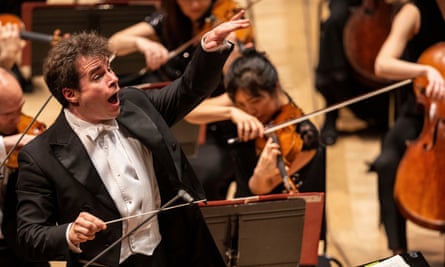Royal Opera House announces Jakub Hrůša as new Music Director | royal opera
The Royal Opera House today announces the appointment of Jakub Hrůša as Music Director. Hrůša, 41, will take up the post in September 2025. He succeeds Antonio Pappano, who steps down at the end of the 2023-24 season after 22 years in the role, making him the Royal Opera’s longest-serving music director. In the 2024-25 season, Hrůša and Pappano will share house responsibilities, and both will appear as special guest conductors.
Hrůša was born in the Czech Republic and studied conducting at the Academy of Performing Arts in Prague, where his teachers included Jiří Bělohlávek. He is currently conductor of the Bamberg Symphonyposition he has held since 2016, and Principal Guest Conductor of the Czech Philharmonic and the Orchestra of the Accademia Nazionale di Santa Cecilia. Between 2010 and 2012, he was musical director of Glyndebourne on tourand he has conducted opera productions for the Salzburg Festival, Vienna State Opera, Opéra National de Paris, Zurich Opera and Frankfurt Opera.
Hrůša spoke exclusively to The Guardian about his appointment and his relationship with Covent Garden, which began with an invitation to direct Bizet’s Carmen in 2018. “My children were very young, so I brought my whole family to London with me. We loved it so much we extended our stay two, then three times, and soon realized we were living in London!” His children have started school and earlier this year he returned to the Royal Opera to conduct Wagner’s Lohengrin, an experience he calls ‘one of the absolute highlights of my life’. He had no inkling that he was being considered for the top job, he said: “I thought it must be so fantastic to work here on a regular basis…and what a shame I have to wait another four or five year. before I’m invited again!
The Royal Opera House is one of the greatest opera houses in the world, but what makes it particularly unique, he says, is the way the drama unfolds on stage alone. “Operas can themselves be places of drama. I was happy both times I worked here to see how focused and smooth the whole rehearsal process and delivery of the result was. The collaborative nature of working relationships and the support offered to everyone is very special.
“It is a very friendly and open-minded house. I feel that we can flourish there. Not just me, but everyone together. I am delighted to accept the position of musical director and I feel extremely excited about the idea of a future collaboration.
Under his musical direction, he promises the opera will continue to feature the standard repertoire, “done with the best possible care”, adding that the Italian repertoire that Pappano championed will remain on the programme. “I love Italian opera, but of course the accent might change a bit.
“Naturally I want to play music from my own country – I want to make the best music written for opera and some of it is in Czech, so of course I’m not going to avoid it,” he laughs. It is forbidden to give details of his first season, but can reveal that Janáček, Prokofiev and Britten will be present and that he will lead his first full Ring cycle in the 2027–28 season; the culmination of a new cycle that Barrie Kosky will direct and which begins with Das Rheingold in 2023 directed by Pappano.
“An opera today should represent the timeless quality of art but, just as importantly, when people go to performances they shouldn’t feel like they’re entering a museum. They must enter an institution that accompanies them in their lives and that is connected to reality,” he says.

Contemporary music, too, will certainly feature under his direction. He won’t be drawn to the composers he has in mind – “commissioning has to be a team decision”, but stresses the importance of contemporary opera to speak and illuminate our here and now. And, “there’s nothing more exciting than bringing something new to the world.”
He decided to be pragmatic about Brexit and the attendant bureaucracy that is causing such problems for the music world. “I don’t like the fact that it happened, but I don’t want to spend all my days complaining about it.” What’s done is done, he argues, and the split has only underscored the importance of opera’s role in connecting people and building bridges.
The issues of diversity, inclusion and representation on and off stage that are at the forefront of every opera producer’s mind today will be central but, he points out, ROH “is already taking this seriously in the right way and at the right pace”.
In short, an opera by Hrůša will not be significantly different from that of Pappano, he thinks. “The excitement in the hallways won’t diminish, it will just have a different flavor and color.”
Above all, he promises to continue to defend an “absolutely unique and irreplaceable” form of art. “There is nothing else in human culture that is so complex and at the same time speaks directly to the human heart.”
Oliver Mears, Director of the Royal Opera, said: “Jakub is one of today’s most exciting conductors. We are all delighted to see how his experiences with some of the world’s greatest symphony orchestras inform his work with the Royal Opera House Orchestra – building on Tony’s legacy of exceptional musical creation. We were extremely impressed not only by his exceptional music and theatrical creation, but also by the generosity and warmth of his personality. He is a true collaborator, able to get the best out of his colleagues. He is level-headed and professional – exactly the kind of personality we need at a time of enormous uncertainty for us as a country and as an organization.


Comments are closed.